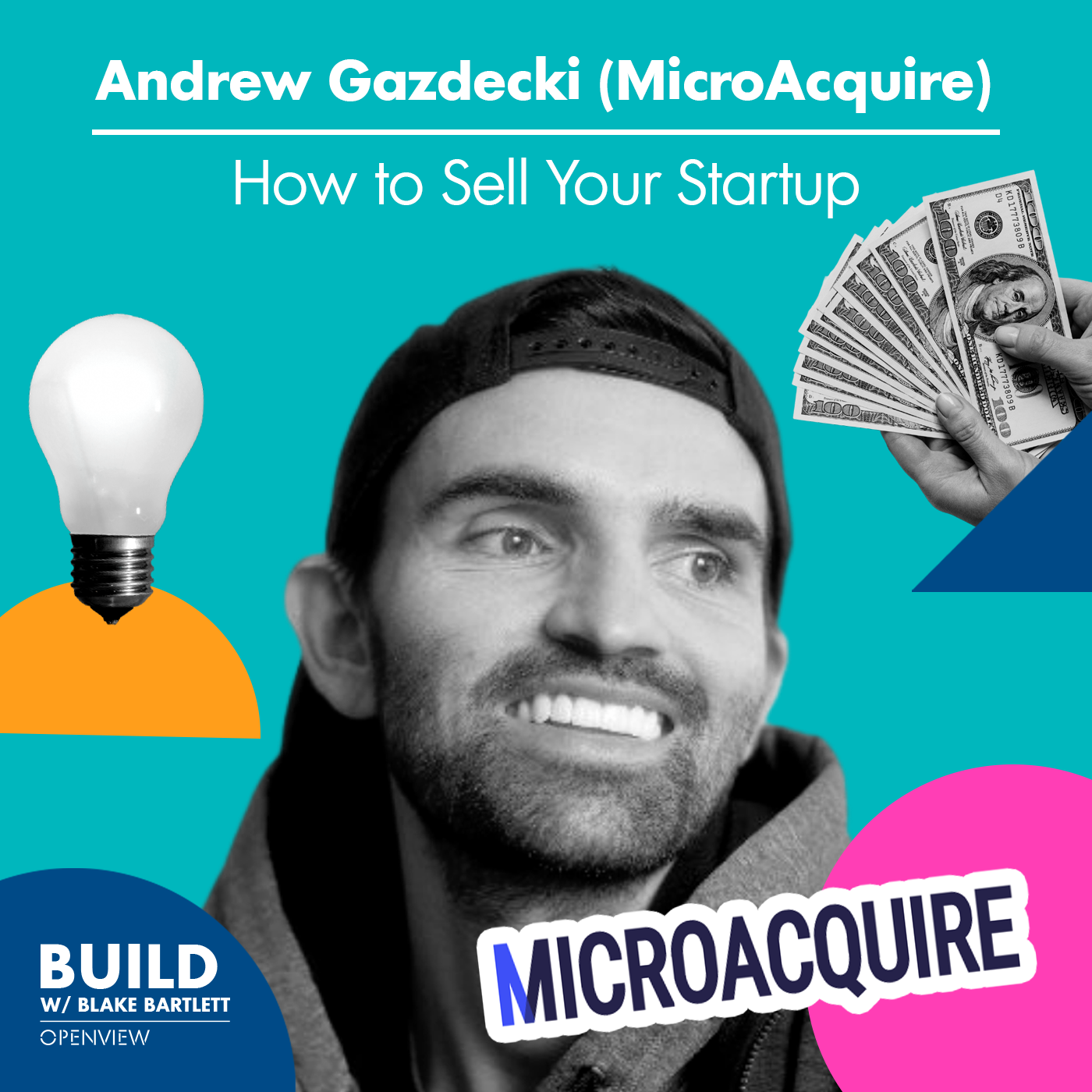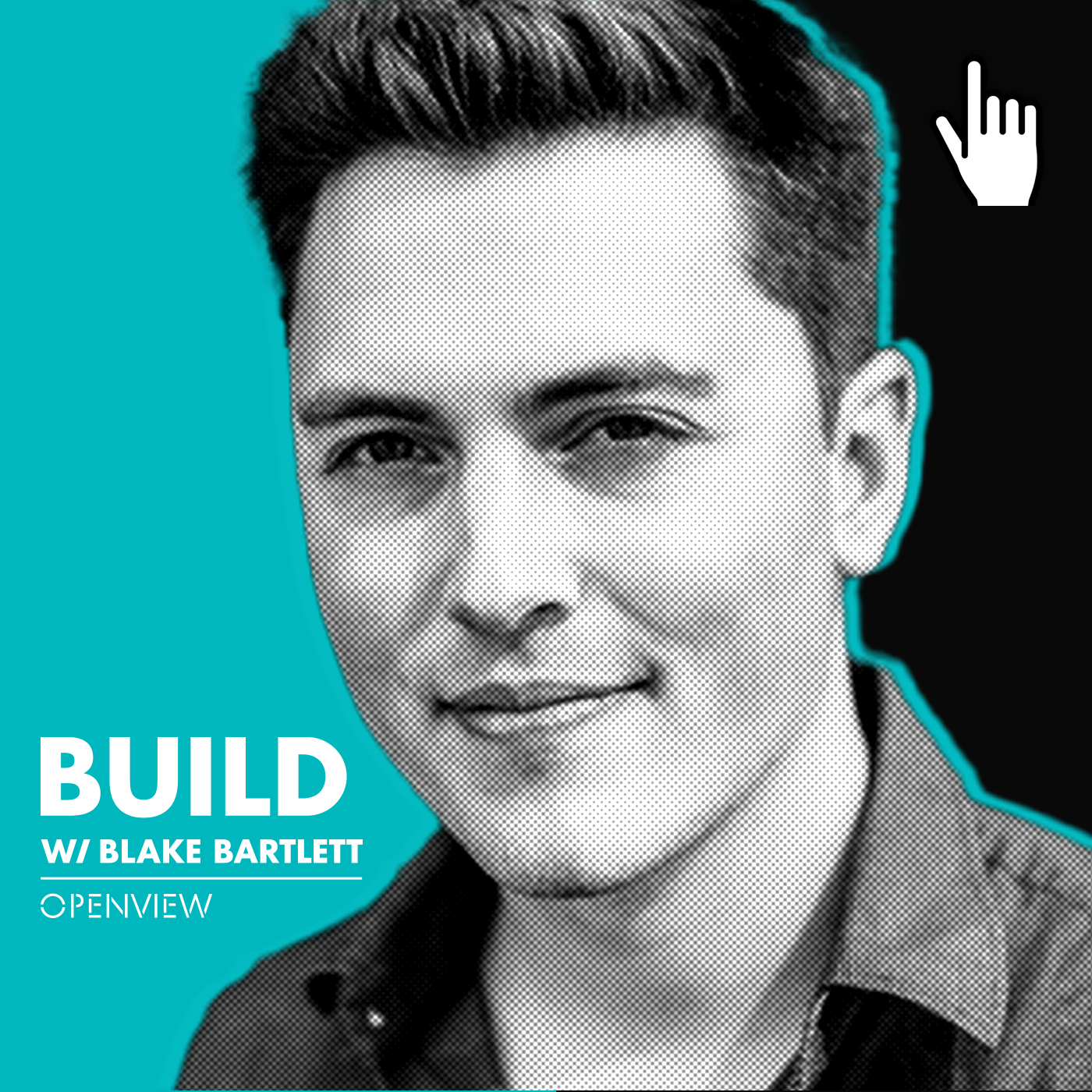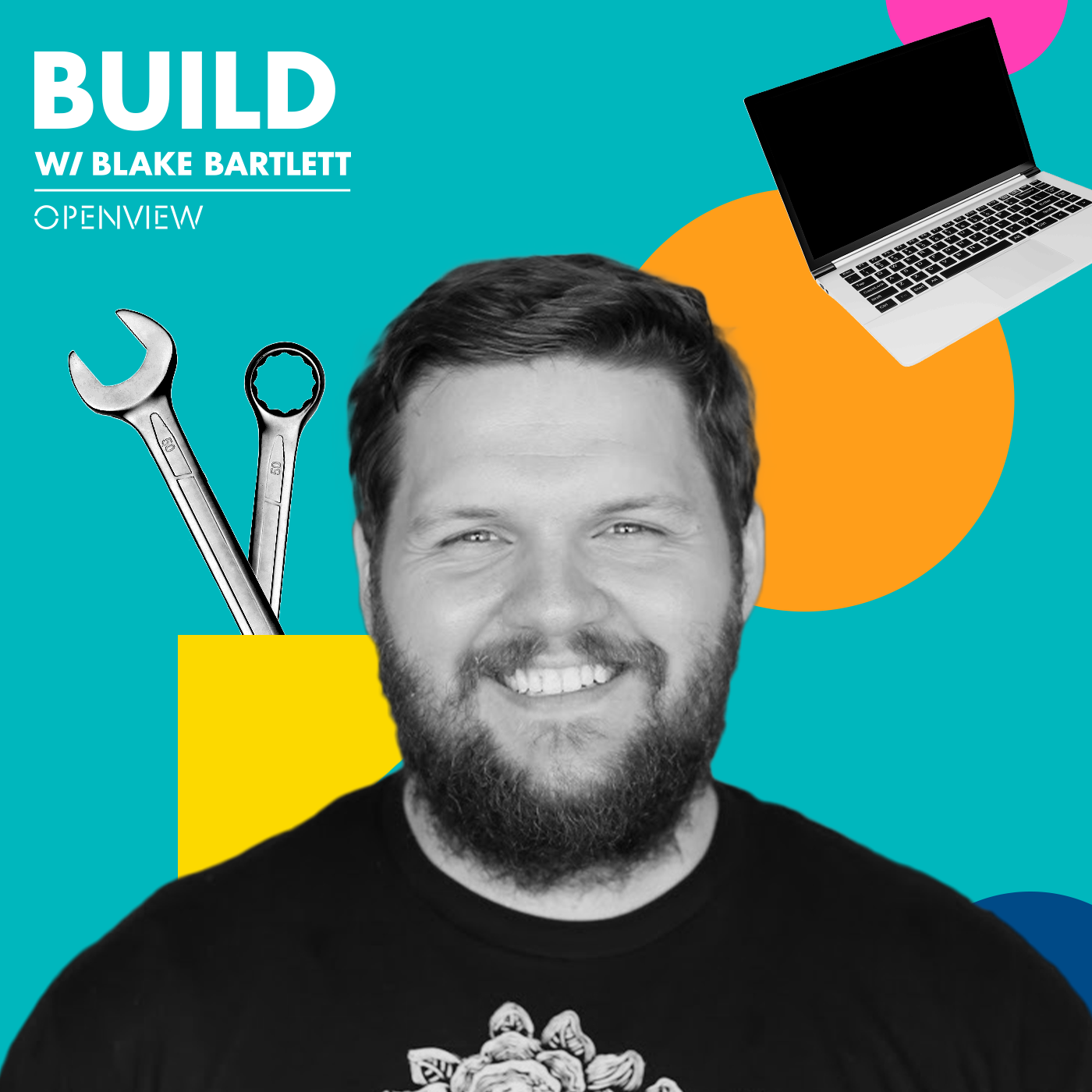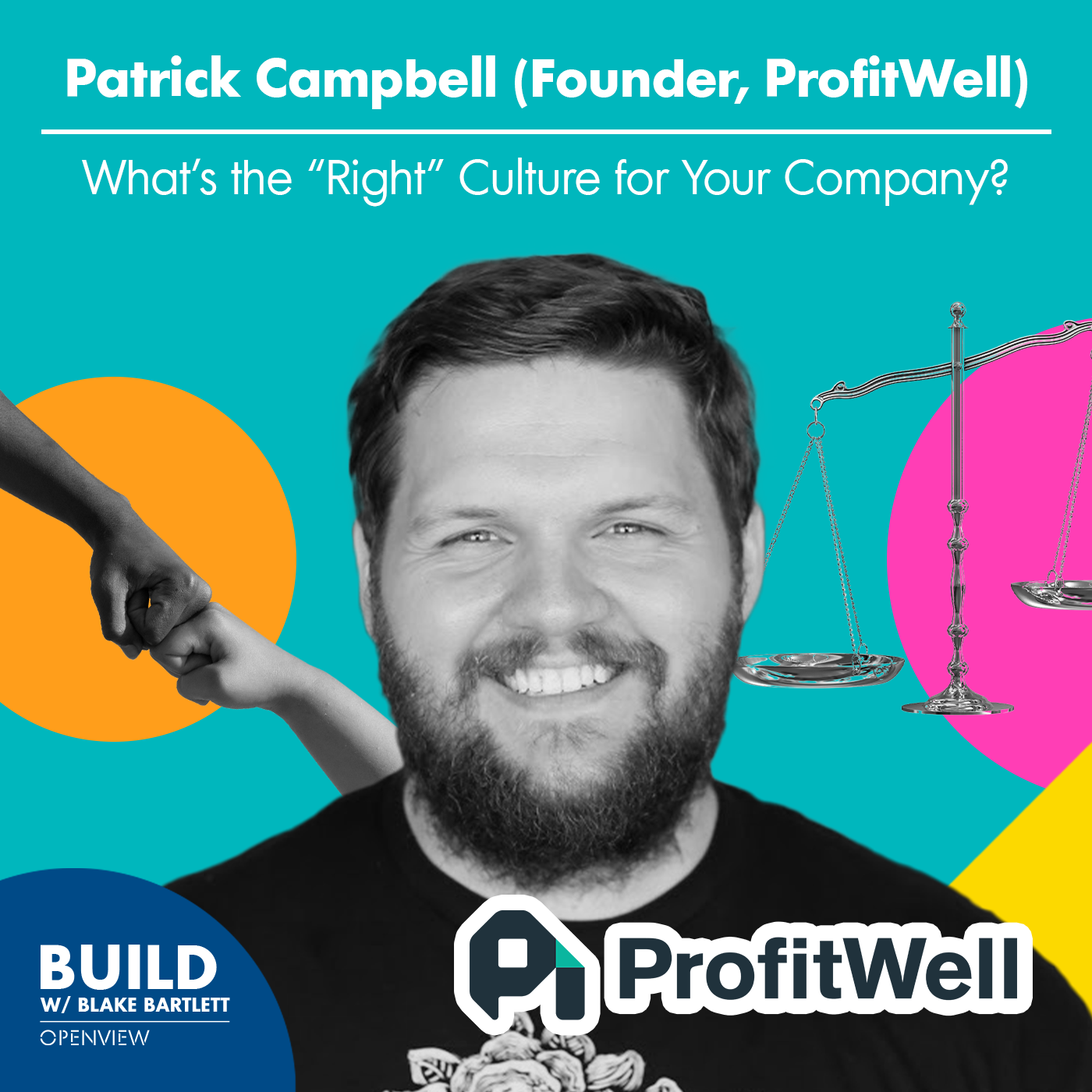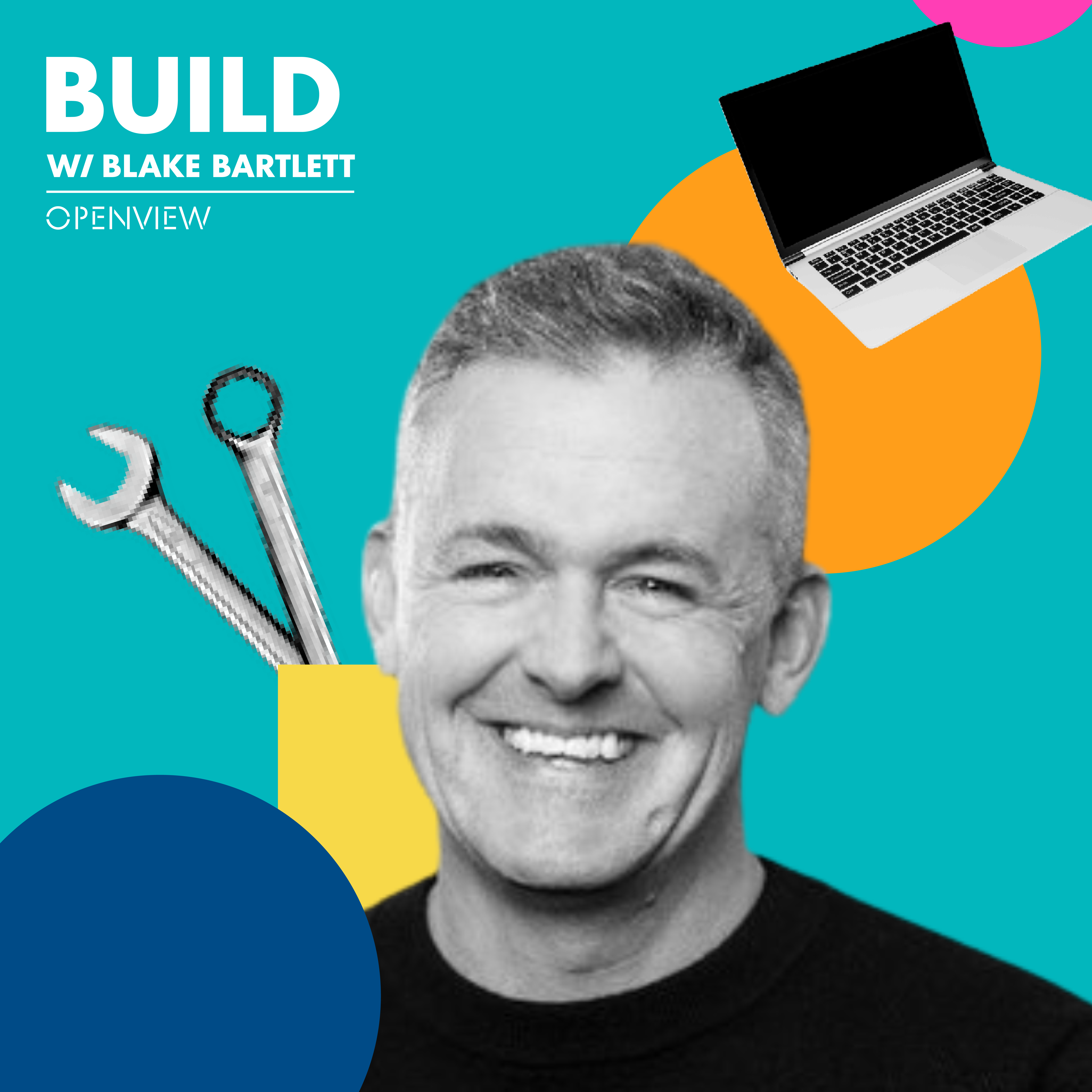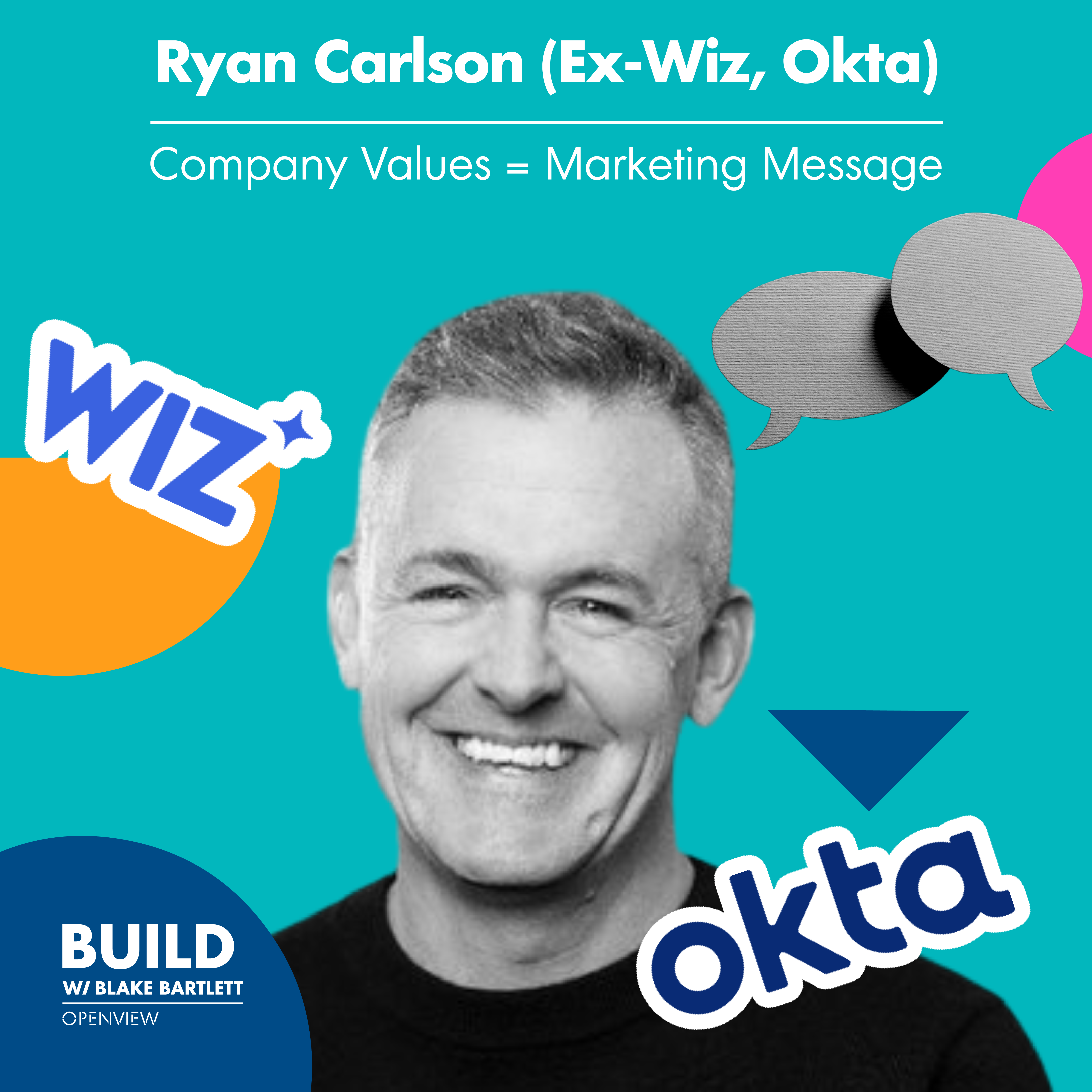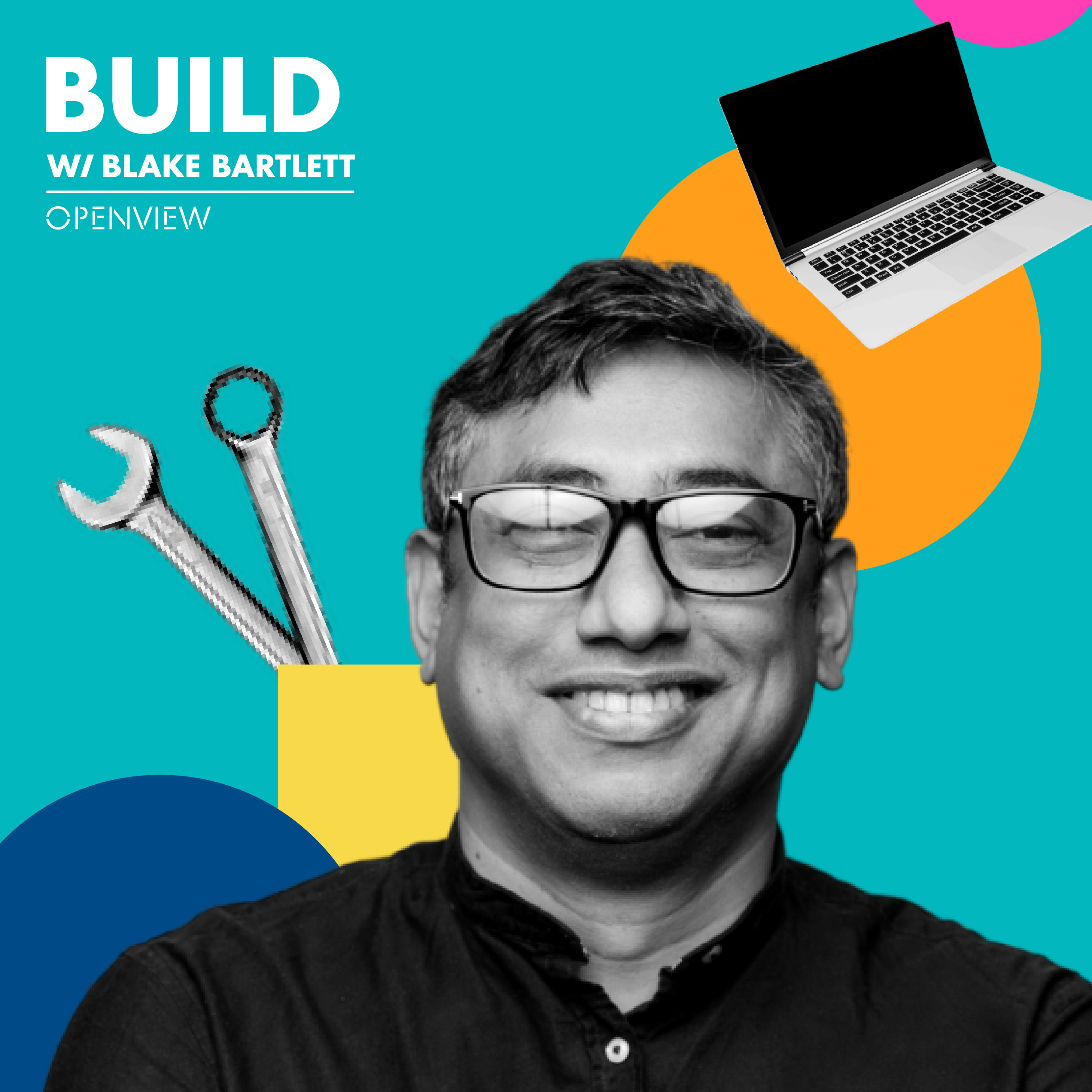Andrew Gazdecki (MicroAcquire): How to Sell Your Startup
- 0.5
- 1
- 1.25
- 1.5
- 1.75
- 2
Andrew Gazdecki: My main goal is to just help entrepreneurs understand statistically, your odds of success and how to maximize those odds.
Blake Bartlett: Welcome to Build, the podcast from OpenView. I'm your host, Blake Bartlett, and the show features conversations with software founders, leaders, and investors. Each episode unpacks a new key insight on how to build your company and navigate the fast changing world of software startups. In today's episode, I chat with Andrew Gazdecki, founder and CEO of MicroAcquire, the founder- friendly marketplace for selling startups. The platform has facilitated hundreds of acquisitions representing hundreds of millions of dollars in combined enterprise value. And prior to starting MicroAcquire, Andrew built and sold to software startups himself. Our conversation is all about selling your startup. There is so much fundraising advice out there, but there's a huge dearth of good advice on how to exit a company. Andrew is trying to fix exactly that with MicroAcquire, and he shares his pro tips with us today. All that and more on this episode of Build. So let's dive in with Andrew Gazdecki. So let's start with your background as a founder.
Andrew Gazdecki: So my first company I started, so that would be Bizness Apps. And I started that company in college. I was 21 and I had actually previously sold a job board that helped connect mobile developers with businesses, and I sold that for like 20, 000, but it felt like 20 trillion, being in college. And I used that as seed funding, and basically what Bizness Apps did was it was a no- code iOS and Android builder for small businesses. And we essentially partnered with agencies around the world to white label our software. So we ended up actually creating more mobile apps than any other company in the world to my knowledge. At our peak, one out of every 20 iPhone apps was developed on the Bizness Apps platform. So ran that company for about eight years. Only raised 100,000 grew it to the 10 million annual recurring revenue mark. We took it to market and then I sold the business. And the way the process happened was I had built up a list of potential acquirers, everyone from strategic buyers to financial buyers. So I just kept in touch with all of those firms because I built the company with the specific purpose of selling and I had two angel investors in the business. So I also had a fiduciary duty to show them a return on their investment. And then when we felt the timing was right, we basically lined up some buyers and then ran a mini- process, and it was successful all around. So super grateful for that experience.
Blake Bartlett: So what was that process like, just on a personal level for you? Was it smooth sailing or were you nervous going through it the first time?
Andrew Gazdecki: Yeah. Literally I was so nervous and that's another interesting part about how small but life changing acquisitions or just really any acquisition in general, people think you just celebrate and you do to some extent, but that whole process, I was nervous. I was stressed out. Is this deal going to fall apart at any moment? Am I doing this correctly? And I had some good advisors in my corner luckily, but I also had to do a lot of selling of the business, pointing out opportunities, how I'd continue to grow the business, et cetera. But yeah, compared to a business like my second, Altcoin, which was much smaller, the team was I believe five, that was more of an asset sale. So we sold that business to pass on the assets that we had developed to a company that had regulatory compliance to take what we had built and commercialize and bring it to market. So let's call it I hit the double on the first one and then a single on the second acquisition.
Blake Bartlett: So we're getting into the territory of all of the different flavors of acquisitions that can happen. And I guess what we typically hear about in the startup world is the big splashy exits, the big IPO, the really big M& A event from a known acquirer. "Salesforce acquired my business," or whatever it is, but those are obviously the minority of outcomes. Very few companies end up going public. Very few companies end up having the Wall Street Journal headline acquisition by Salesforce or whatever the big acquirer is. So if we take those off the table, the ones that get all the attention, what happens to all the other businesses and what are the paths that are available to folks?
Andrew Gazdecki: Starting with the big acquisitions that everyone hears about, the billion dollar outcomes, even 500 million, these are exorbitant amounts of money. But the reality is that 98% of acquisitions are under$ 80 million. So you're a statistical anomaly if you can sell a business for over$ 100 million, same goes for building a unicorn startup. But a lot of businesses, the majority of them are sold for much less than$ 80 million. So the routes for selling a business when you can sell above a$ 100 million is you can hire an investment bank, your existing investors are usually being courted by strategic buyers. But for the majority of startups, there's really no clear path on how to sell your business. And that starts from meeting buyers or a clear path on what is the process, what are some things I should be preparing for? So the only options today are working on the lower end. So if you're selling a business that does maybe a couple million in revenue, you're typically going to working with a business broker. They'll charge about 15% commission for the success of that sale. And there's very few of them.
Blake Bartlett: Let's get into some of the practical stuff here. So how do you actually get acquired as a startup? What you said before was incredibly helpful to demystify the idea that there are more options available to you than just you have to become a unicorn company, or you have to get acquired in this huge acquisition. There's lots of other paths, but they're complicated. So what does it take to sell the company? What I hear a lot of times in the common refrain in the startup world is that companies are bought, not sold. So with that as guidance, how do you sell a company? Is this idea of being bought not sold, is that true? If it's not true, then how do you pull it off?
Andrew Gazdecki: It's not true, at all. Like with Bizness Apps, I had to sell that company, map out buyers that I thought were a good fit. I had to sell them on the opportunity. But again, with most startups being under let's call it $ 100 million, you do have to sell. So you got to be prepared. You got to be transparent. You got to understand what a fair valuation for your startup is. The number one way to sell your business is just to have a good business. Have a good, healthy business, good unit economics, and having a good VP of finance or CFO inside your business can create a lot of good will with buyers, just as they're evaluating your business, you're going through due diligence. You're going to get a lot of financial requests and data requests and having someone on your team that can get that over quickly and accurately can really build trust with the buyers. So you also want to have a good relationship with the potential buyers. You're getting to know them, they're getting to know you, and then you're pointing out all these things that they can do with the business, ways to grow it, ways to make it more profitable. Also just understanding what goes into an acquisition, what is due diligence? What are the legal steps? What are some yellow flags that are common amongst acquirers? Understanding what you're getting into as you're going into an acquisition I think is key to ensuring the deal gets over the finish line, because tons of deals start, but they never finish.
Blake Bartlett: This conversation about in reality, companies are sold not bought, it does make me think of the old school way that investment bankers describe working on a business, which is that they're marketing the deal or they're marketing the company. And that is both banker jargon and finance jargon, but there's actually a lot of truth to that. And that's what I'm hearing in your description, is that M& A is marketing and what is marketing? Well, marketing both needs to be informative, "Here are the facts about our business. Here's our product and its capabilities. Here are our numbers and the trends. Here are our customers and their use cases," so there's some informative facts there. But then there's also in marketing a storytelling element and you're telling a story. And in the context of your company, there certainly is the story of your company, your founding story, why'd you start the business, how has it evolved and those types of things, but there's also the story of your company in the market. What's happening in this market? What's changing? What are the different forces that are in this market and how are you competing with them or cooperating with them? And you're telling the story of your company and really because you want somebody else to believe the story, to buy into the story and then to ultimately buy the company. So this element of marketing seems to be a really critical factor.
Andrew Gazdecki: I couldn't agree more. And that really goes down to again, selling your business, understanding that this is an asset that you own and you know it better than anyone. You know what's great about it. You know the potential opportunities that you haven't executed on that maybe an acquirer could run those plays and grow the company even further or things that need to be fixed, like easy wins. Sometimes surprisingly having things that are maybe small bruises, like low hanging fruit can be attractive to some buyers because they see that and they say, "Hey, I'm an expert in that area and I'll fix that." Another thing that I think a lot of entrepreneurs get wrong when they look to sell their business is they view it as this transaction, "Here's the keys and I'm just going to walk away and go lay on a beach." But the majority of the time, who you sell to is almost as important as the price. Is this a reputable firm? Is this someone who sees potential in your company? Are they going to treat your company in a way that you're comfortable with post- sale? There's a quote by Warren Buffet, " You can't do a good deal with a bad person." So...
Blake Bartlett: Yeah, it's amazing that there's so much advice that's given to startups on fundraising, which is either getting your company off the ground or getting gas in the tank so that you can fuel your continued growth. And there's a lot of advice. There's a lot of innovation. There's a lot of best practices. There's a lot of people that are there to help at that stage and for those aspects of your business. And those are really important if you're taking on an investor, especially if it's a VC, who's going to take a board seat, that's a really, really critical, important decision. So you get all this attention on fundraising, but then there's almost no advice or bad advice usually on the other end of the spectrum, which is the next most important, if not the most important thing that happens in the business, which is are you going to sell it? Are you going to exit? What happens with this company over time? And the bad advice, I think we've gone through it and you've helped to demystify it in a lot of ways. Bad advice point number one is that the only option is an IPO or a big, splashy M& A event. It's like unicorn or bust. That's a myth. The second myth is that companies are bought, not sold. That's actually not true. They're sold, not bought. And you have to put effort into that process, and then the third one is that it's a partnership or should be viewed more like a partnership than the transaction where you hand them the keys and walk away. So when you reframe it that way and say, all right, these are all common misconceptions and a lot of the advice is really reinforcing these common misconceptions versus actually being helpful, it's really clarifying to be able to actually get your arms around because it is a beast and acquisition is a beast and it's not easy and it can be daunting, and you don't know how to do it until you go through it. So how do you eat an elephant one bite at a time? It's that kind of a thing, once you've been able to define it and demystify some of these misconceptions.
Andrew Gazdecki: A funny story, so the first thing that happened to me when I sold Bizness Apps was I literally had probably 10 friends of mine that are startup founders reach out to me. And they're like, "How did you sell your business? What happened?" Almost wanting to know behind the curtains like, you saw the movie, what happens? The wire transfer, what's the stock purchase agreement? How was due diligence? And it was very surprising to me. I was like, " Oh, I thought I was the only one who didn't know about this stuff." But surprisingly as founders, we're not trained to sell our businesses. We're trained to get to the top of Mount Everest and have a decacorn and go public. And then anything less than that, unfortunately today is viewed in some circles as a failure. But in reality, selling a business for one, two, five, $ 10 million is a life changing moment for 99. 99999% of people. I'd love to see those acquisitions celebrated more because they created an enterprise value, but that's never getting mentioned in Wall Street Journal or something like that, as you said. So we hear so much about these outsized returns or acquisitions, which are really, again, statistical anomalies. It gives you a skewed view of what startups and exits are really like.
Blake Bartlett: I'm realizing as I'm listening to you go through that, the advice that you often hear, it really does a disservice to your average founder. And people throw it out so nonchalantly, and they'll just refer to businesses as lifestyle businesses. And it has this negative connotation of like, "Oh, that's just a lifestyle business. You're not building a real company. You aren't raising venture capital. You're not trying to take over the world, so you got that nice little hobby on the side." And just talking that way, again, it's a disservice. And it reinforces this idea that there is only one path worth going on as an entrepreneur. And that's just fundamentally not true. And I also think the other thing that reinforces that if you're primarily talking to VCs about this is that VCs have this amazing ability to call something that is life changing a small outcome, because they're looking through their big fund lens and their big fund now. They're like, "Oh, you sold that for$ 25 million? That's a nice little outcome for you."
Andrew Gazdecki: "That's cute."
Blake Bartlett: "That's cute."
Andrew Gazdecki: Yeah, that's cute. Yeah. That's a cute one. Yeah.
Blake Bartlett: And it's like, yeah, I get it. For a VC fund that might be a billion dollars, that's not going to move the needle. But that doesn't mean that creates a situation where there is only one flavor of successful startup, but you're doing amazing stuff to drive this conversation in the startup community because it's so needed. There's such a dearth of good advice out there.
Andrew Gazdecki: My main goal is to just help entrepreneurs understand statistically, your odds of success and how to maximize those odds. 0. 05% of startups, so half a percent of startups actually raise venture capital. And then out of that, only 1% actually reach unicorn status. But then there's just this long tail of other startups that you never hear about. They're operating profitably, sustainably. They're building really great businesses, and I think that should be celebrated more because it's more realistic. And just letting entrepreneurs know that, "Hey, getting acquired for$ 5 million is pretty cool," but we don't hear about it. So that's all I'm trying to do is just educate. You have this route, but there's also this other route that might be just as meaningful for you.
Blake Bartlett: So we've been circling around it at the more conceptual level. So let's zoom into the hyper- practical, because I'm sure there's a bunch of founders that are listening right now who feel like they are you in 2018 or you maybe in 2016, I've been running this business for a little while. It's growing. It's getting to some scale. I'm not sure that I want to do it for the rest of my life. I'm starting to think about what an exit or what a sale would look like. It's probably not happening tomorrow, but it might happen in the next one to two years. So how do I set up for that? So what should that founder who's listening right now be thinking about in order to set themselves up for a successful sale?
Andrew Gazdecki: The number one thing I always say to start with is understand why do you want to sell? What is your reason? It could be to cash out. You built an asset that is valuable and you think it could be in better hands, and that's probably the most common reason. Others is I'd like to just move on and work on another startup. Having that story down is key, because it's the first question every buyer asks, it's like, "Why are you selling?" And if your story isn't rock solid, then buyers are going to be like-
Blake Bartlett: "What am I not hearing? What are they not saying?" is what's going through the buyer's mind.
Andrew Gazdecki: And just being honest, it's okay to just say, "Hey, I want to sell my business." And this is another weird thing that I did myself, where someone is interested in potentially buying your business and you do this weird dance of, "We're not for sale, but we are if you say this price, but we're not for sale." You play this hard to get game, but if you want to sell your business, just be upfront, be like, "Yeah, I want to sell my business. I'm prepared in terms of I built a data room out that has..."There's levels of data rooms too. But as it gets more serious, buyers will make requests that you can build a data room as you go. So you want to make sure that you showed them that, okay, I'm serious. But also just tips is you got to be willing to walk away too. The person who wins a negotiation is the person who cares the least. We have some people throw out some offers, and we just walked away from them, because it wasn't in line with how we felt the business was valued. But you also have to be willing to if your business doesn't sell, keep going. I think the worst thing you can do in a big pitfall that entrepreneurs make is thinking they're going to sell their business and they don't. And then they stop growing.
Blake Bartlett: So all of this leads to MicroAcquire, the business that you started and are now running. So I guess, what is MicroAcquire and how can startup founders leverage the service to achieve everything that we talked about today in terms of selling your startup?
Andrew Gazdecki: So I built MicroAcquire just out of personal pain, and I just felt it needed to exist. We have platforms like TechCrunch and Producton for startup discovery. We have platforms like AngelList, Wefunder, Republic, a number of other ones for investing, but there was nothing on the exit side, which I thought was insane. So I built a marketplace that allows founders to sell completely free. So there's no fees. So no 15% broker fee, no fees to investment bankers. And it allows you to immediately meet buyers without any middlemen. So we removed the gatekeepers that were potentially hindering a lot of startups from getting acquired. And the way it works is basically you sign up, everything's private. So everything that you put on your listing, a buyer would reach out to you and you do due diligence on that buyer. You can review their LinkedIn profile, you can ask them questions. You can have them sign an NDA, and then you give them access to a mini- data room, which usually just contains high level information. Then if it gets more serious, you move into due diligence where you share a more comprehensive data room, but I just thought startups need a place for them to go when they're looking to sell. So rounded up all the private equity buyers, rounded up all the corp dev teams, all the roll- up plays that we're seeing today, all the aggregators, just brought everybody into one place where sellers and buyers can speak directly without a middleman. And then on top of that too, we realized that selling a startup is very confusing. So if you're listening to this podcast and you're at this point and you're like, "Whoa, there's a lot that goes into an acquisition," we have a marketplace within our marketplace, so Inception style, where you can hire a business broker, you can hire an investment banker, you can hire an M& A advisor. You can hire an attorney. You can hire someone to help with valuing your startup or helping with due diligence or creating a data room. And we're able to do this, but offer these services at a much lower cost. Otherwise you can just sell your business on your own. And we have a wealth of resource. We have courses, we have topics on valuations, how to attract more offers, how to build a data room. Our goal is to build the world's most founder friendly startup acquisition marketplace. So this isn't a marketplace for buyers to come and get really good deals on startups and stuff like that. We built this for startup founders. So whether you're in a case where you have a greatly profitable business and you just want to meet buyers and sell the business, you can list on MicroAcquire and start meeting buyers in usually the same day. Or you have a really big business and you don't know which investment bank or M& A advisor to work with and you want to work with them because of the complexity of the deal. We're essentially building out a Yelp for M& A advisors. And then on the buy side, it's free to sign up. And then in order to contact sellers, you just have to subscribe to what we call MicroAcquire Premium, where we vet you as a buyer, we looked at your LinkedIn profile. We ask you a few questions, and then that gives you access to contact sellers for them to review your profile and grant you access.
Blake Bartlett: So on this big, complex topic of selling your company, step one in order to demystify this is to listen to this podcast episode. So everybody that's listening right now is already one step ahead. Step two is to listen to and follow content from Andrew and from MicroAcquire. I've listened to a bunch of podcast episodes where you've been on and shared just amazing advice for founders going through this experience. And then step three is to go check out MicroAcquire, because all of the complexity that we talked about, that's exactly what you're trying to simplify and make easy, self- service, and accessible to founders, so that this big decision that is the biggest event of a company's lifetime is something that is less daunting, generates less paranoia, and is something that you feel like you know how to navigate.
Andrew Gazdecki: If you're looking to sell your startup and you could use some help, definitely reach out. We're happy to help.
Blake Bartlett: Thanks for checking out Build. If you enjoyed the conversation today, make sure to subscribe on your favorite podcast platform and leave us review so that others can find the show as well.
DESCRIPTION
There is a dearth of good advice on how to sell or exit your startup. Most people use outdated slogans like “companies are bought, not sold” but offer little practical advice to navigate a daunting M&A process. Andrew has sold two software companies previously, and now is building MicroAcquire, the founder-friendly marketplace for selling startups. He shares everything he knows about selling companies.
Mentioned in this episode:
Sign up for OpenView's weekly newsletter
Andrew Gazdecki, CEO of MicroAcquire
Subscribe to Blake Bartlett on YouTube.
Podcast produced by OpenView.
View our blog for more context/inspiration.
Today's Host
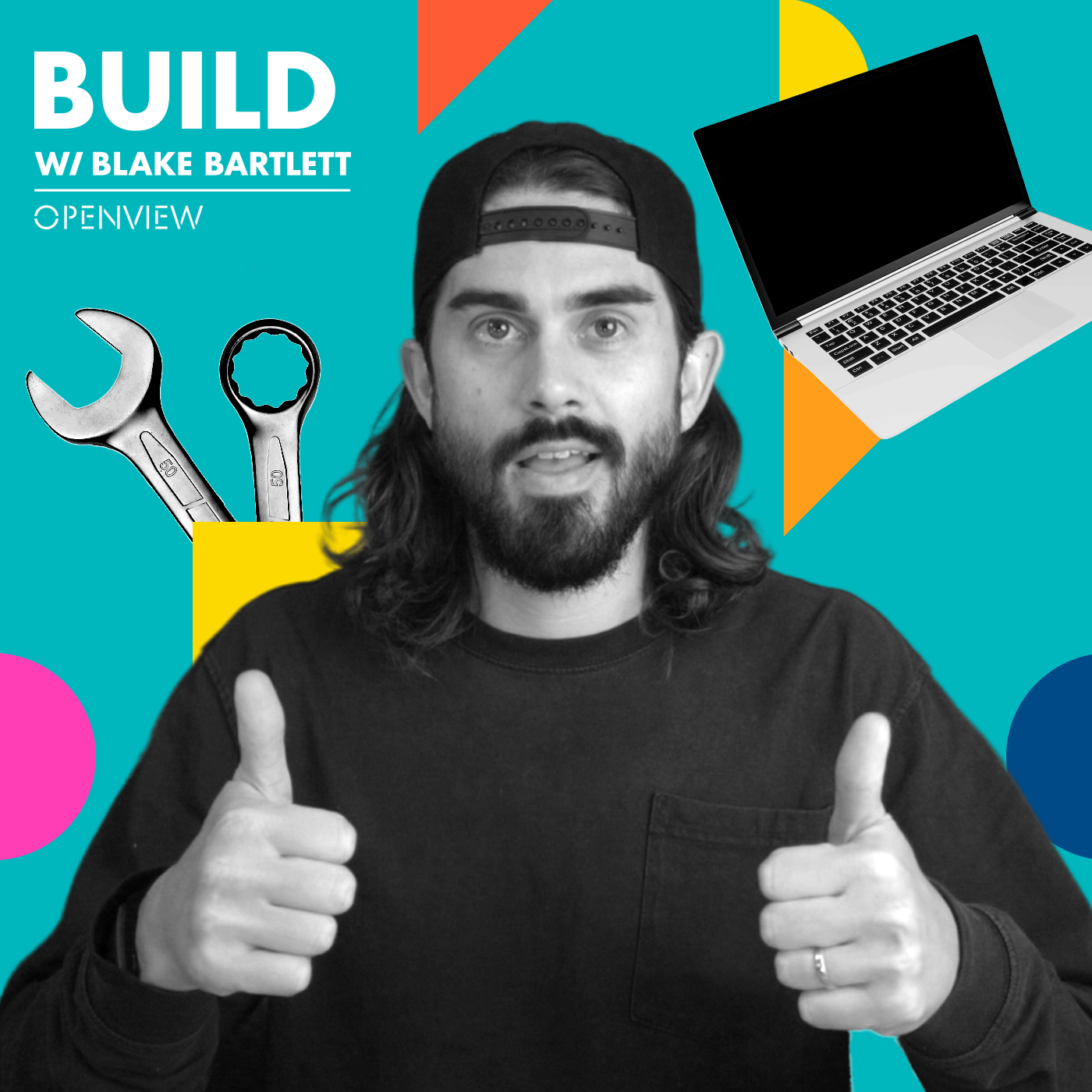
Blake Bartlett
Today's Guests

